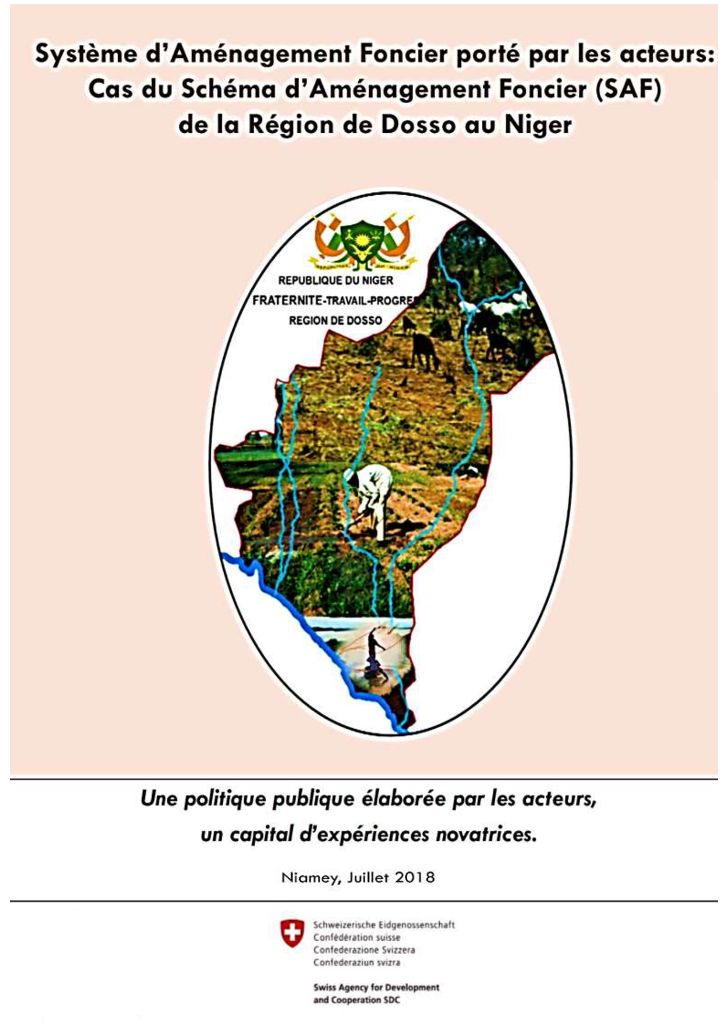« Contractualiser pour transformer : enjeux pour les agricultures africaines », colloque international de FARM à l’OCDE
Artificialisés, accaparés, appauvris les sols sont assaillis de tous côtés
Date: 3 janvier 2019
Source: Reporterre.net
Par: Marie Astier
Les sols sont vivants, indispensables à la vie, et presque non renouvelables. Ils sont pourtant assaillis par l’étalement urbain et des pratiques agricoles désastreuses. Sans oublier l’intrusion croissante de sociétés foncières spéculatives. Un rapport parlementaire alerte sur cette situation et appelle à une grande loi foncière.
Système d’Aménagement Foncier porté par les acteurs : cas de la région de Dosso au Niger
Date: 2018
Source: Foncier& Développement
Ce document de capitalisation présente le processus d’élaboration du schéma d’aménagement foncier (SAF) de la région de Dosso au Niger.
Water, food and energy nexus challenges
Comprehensive yet concise report outlining the key challenges and projected demands in the global agricultural sector, from an energy-water-food nexus perspective.
Tribes, state, and technology adoption in arid land management, Syria
Discusses the widely help conception that arid shrub-lands in Syria and elsewhere in West Asia and North Africa are degraded. A particular characteristic of such areas is a preponderance of unpalatable shrubs or a lack of overall ground cover with a rise in the associated risks of soil erosion.The article finds that:migrating pastoralists have been the scapegoats for this condition of the range.
Water-smart agriculture in East Africa
The inspiration for this sourcebook came from a 2014 meeting of researchers, practitioners and policy makers in Addis Ababa under the auspices of an event co-convened by the Global Water Initiative East Africa (GWI EA), the International Water Management Institute (IWMI) and the Water, Land and Ecosystems programme of the CG system. The event agreed there was a pressing need for greater regional consolidation of knowledge on improving water management for smallholder farmers.
Improved land management in the Lake Victoria basin: annual technical report July 2001 to June 2002
This report addresses the challenges of land management in the Lake Victoria basin of East Africa. In 1999 the World Agroforestry Centre launched a major effort to identify, diagnose and reverse degradation in the Lake Victoria basin, focusing primarily on the Kenyan part of the basin. Dubbed “TransVic,” this project was supported by a number of donor agencies and collaborators, with particularly strong support from the Swedish International Development Cooperation Agency (Sida).
Conserving land, protecting water
Following from the Comprehensive Assessment of Water Management in Agriculture project, this book examines the relationships and linkages between land use and water management and social systems. Given that agriculture is the largest economic sector in many developing countries, this volume provides innovative ideas for the prevention of land degradation and for improving the sustainability of food production in the developing world.
Soils on the global agenda: developing international mechanisms for sustainable land management
This report contributes to the aim of the International Union of Soil Sciences to put sustainable land management higher on the global agenda. The report is divided into three distinct sections:Part I discusses the global soils agenda and outlines experiences and strategies for sustainable land management. It also highlights challenges related to implementing this agenda globallyPart II presents summaries of papers on the development of international mechanisms and instruments for sustainable land management (SLM).
Land management programme in Tanzania
Evaluation of LAMP in different contexts:broader change processesdevelopment thinkingcomparative analysis of different conditions of LAMP in the four districts it has been implemented inFindings include: recommending that the programme shifts focus from considering its core as natural resources management to one of support to the empowerment, mobilisation and capacity building of village communities with emphasis on natural resource managementconcentration should be on production, environment and rightstechnical assitance should shift towards capacity building and empowermentstakeholder par
Sustainable wetland management in the face of climate risks in Niger: the case of La Mare de Tabalak
The International Institute for Sustainable Development (IISD) recently implemented climate risk management studies in seven countries. This report, commissioned by the United Nations Development Programme’s Bureau for Crisis Prevention and Recovery, gives a detailed summary of efforts in a Niger wetland environment to conduct one such study, incorporating climate change with three key sectors: agriculture, livestock and water resources.





